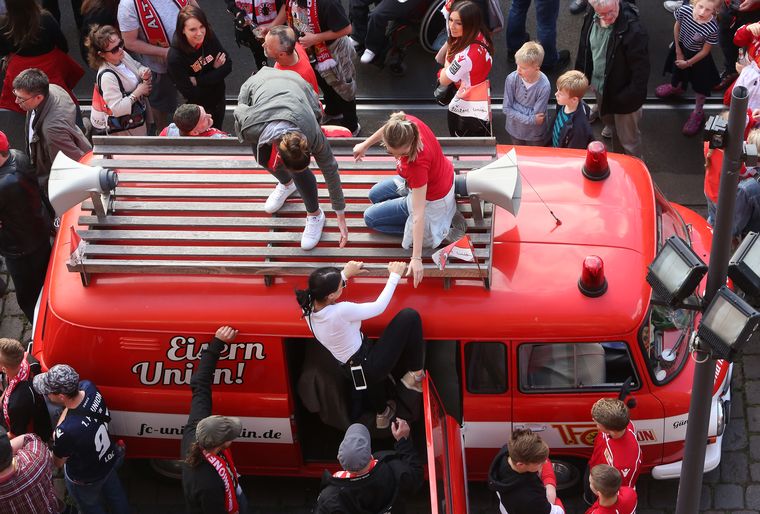The Bundesliga is run on the principle that a football league must be responsible to its fans, irrespective of cash and class. This is football as it is meant to be. At the core of this vision is the 50+1 rule—a clause in the regulations of the German Football League (DFL), which runs the Bundesliga. The clause states that in order to compete in the Bundesliga, a club must hold a majority of its voting rights—the club’s members must own at least 50 per cent of the shares plus one share.
Since commercial investors do not have a majority stake, they have to respect the wishes of the fans. The 50+1 rule was introduced in 1998, when the German Football Association (DFB) allowed clubs to convert their teams into companies. Prior to that, football clubs in Germany were owned by members’ associations and were run as non-profit organisations. Today, the rule is responsible for the greater financial discipline of the German clubs in comparison with their European counterparts. Moreover, there are clear policies regarding the salaries and benefits of club employees, and ticket rates.
Even as the Roman Abramovichs of the world continue to dominate football leagues, experts felt that the absence of investors like him is good for the league. This is because the team management or administration cannot be pressured as per the whims and fancies of a millionaire owner. Exceptions to the 50+1 rule are few. Entities which founded clubs or those that have substantially funded a club for 20 continuous years are allowed to own controlling stakes. The first scenario applies in the cases of Bayer 04 Leverkusen, founded by pharmaceuticals company Bayer in 1904, and VfL Wolfsburg, founded by Volkswagen in 1945. SAP co-founder Dietmar Hopp acquired a majority stake in 1899 Hoffenheim in 2014, after nurturing the club for two decades.
RB Leipzig is another club not owned by fans. The club, owned by energy drink company Red Bull, is not listed, and therefore does not violate the 50+1 rule in letter. The company had purchased the playing rights for a club in the fifth tier, which is outside the DFL’s ambit, in 2009. However, after quickly moving up the German football ladder, the club had to make significant changes, including ensuring the club management’s independence from Red Bull, before playing in the top division. Leipzig continues to be disliked by many Germans for its commercial setup.
Though ownership is denied to big investors, there is focus on sponsorship deals. Twenty-eight time champions Bayern Munich are perhaps the best example. Their stadium is named Allianz Arena, thanks to the sponsorship by the European financial services company. The fact that German football legends are at the helm of many clubs helps bring in sponsorship deals. However, huge deals do not mean excessive spending. There are healthy regulations to ensure this. Thirty-eight per cent of the expenses incurred by Bundesliga clubs goes towards salaries and wages; it is 67 per cent for English Premier League clubs. Squad-building is aligned towards youth development and scouting for young players abroad rather than signing big names.
In 2009, hearing-aid magnate and president of Hannover 96 Martin Kind had sought to overturn the 50+1 rule; 32 of the other 35 clubs playing in the top two tiers voted against it, while three abstained. But the rule could be modified in a few years, causing a sea change in German football. Business-oriented investors are not likely to be so patient with the current youth-centric model, where there are little short-term benefits.
Bayern has proven the effectiveness of the current model by showing profit for 27 consecutive years. The club’s turnover increased 14.1 per cent in the last season to reach €750.4 million. This includes €196.5 million from sponsorship and marketing, €179.1 million from matches, €91.5 million from merchandising, €90.3 million from player sales and €124.5 million from their share of the league’s sale of broadcasting rights. This financial base has helped the club’s football dominance. However, what is remarkable is that the Bayern youth academy will become financially self-sufficient next year. The club’s financial success is good news for all shareholders as it has decided to give 50 per cent dividend per share.
Another great German success story is Borussia Dortmund, the football club with the highest average attendance in the world—around 80,000. Carsten Cramer, Borussia Dortmund’s marketing director, told THE WEEK: “Everyone is talking about the Premier League; about Etihad and Emirates. What they have are theatres, not football stadiums. We think about the welfare of our fans. Not just about money.” He added that money is the only thing driving the Premier League. “We look at the Dortmund DNA, not just marketing strategies,” said Cramer. “What is worrying us is that of 1.5 lakh members, only 55,000 get tickets. The waiting list before us for each match is awe-inspiring.” He said that football was the glue holding society together. And that is why ticket sales have been fixed at less than 10 per cent of the total revenue. “That is why we provide all facilities at the stadium,” he said. “That is why there is free WiFi and also why WiFi is turned off before kick-off. Once the match starts, the hands of the audience should not go to their mobile phones. They should be free to applaud.”



